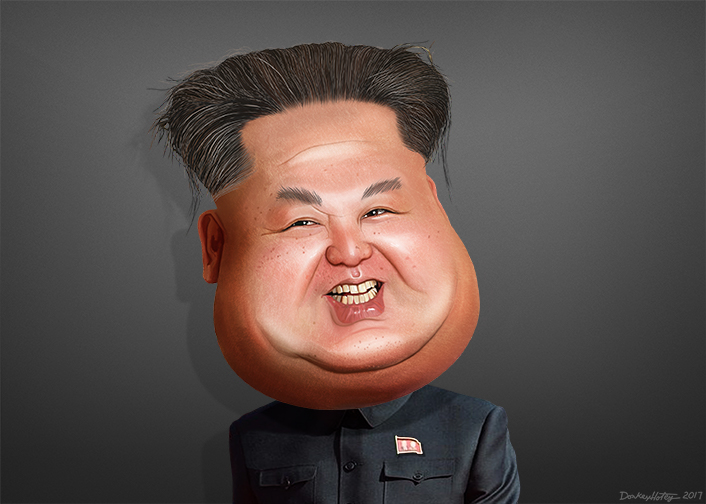The North Korean Quagmire
Photo Credit: DonkeyHotey
May 20, 2018
Oppenheimer mused, as a brilliant fireball engulfed the bleached sands of New Mexico, “Now I am become death, the destroyer of worlds.” This oft-quoted line from the Bhagavad-Gita has since been used with great effect to portray nuclear weapons as negative and destructive. Notwithstanding Oppenheimer’s foreboding, however, the United States’ deployment of these same weapons of mass destruction has ironically prevented numerous wars through deterrence. This 20th, now 21st, century concept of deterrence has shaped the new world order that has formed since the collapse of the Soviet Union in profound ways. However, with the addition of new members into the exclusive “nuclear arms club,” there is always one fundamental concern: proliferation, better known as a nuclear arms race, and the consequential need to enforce nuclear responsibility.
Central to the modern “Korean problem” is the North Korean ideology of Juche, an all-consuming economic and political state policy of self-reliance for self-preservation, coupled with a Darwinistic worldview held since the North’s inception. North Korea has shown consistently that Juche is applied in every state-sanctioned activity: sending workers abroad whose families are held hostage in order to get foreign currency, kidnapping South Korean film directors, and most importantly, developing nuclear weapons. The North perceives its economic weakness, diplomatic isolation, and military obsolescence as a serious vulnerability, and the strength and stability of South Korea and the United States as an existential threat. Thus, far from an impetuous and irrational dictator, North Korean leader Kim Jong-un’s disruptive saber-rattling is merely intended to buy time and confuse other leaders until nuclear weapons are fully developed.
In the disquiet that followed the first North Korean nuclear tests in 2006, the terms proliferation and deterrence were floated in academic circles, policy forums, and news cycles regularly and were debated extensively in campaigns and colleges around our country. The United States and much of the world have an interest in maintaining the status quo in preventing a domino effect of nuclearization, the belief being that, if North Korea develops nuclear weapons, South Korea will follow, then Japan, then Indonesia, until, in the words of satirist Tom Lehrer, “Alabama’s got the bomb.” In practice, preventing proliferation is an active diplomatic task, made especially difficult by North Korea’s supreme isolation.
The North’s leader Kim Jong-un has, for various geopolitical developments in the United States and Europe, determined now the perfect time to perform his signature move: a 180° diplomatic reversal. After years of militaristic rhetoric before and after nuclear tests, he suddenly resolved himself to achieve peace and unity on the peninsula, smiling in front of cameras and signing symbolic documents. While some might say that he is taking steps none of his predecessors did, and that he therefore must be a completely different ruler, Kim Jong-un has still not given any solid commitments to Western diplomats or international bodies. His actions have been mostly “goodwill” diplomatic gestures towards the South or the international community, and most diplomats are highly skeptical that recent events, even including the “historic” meeting between Kim Jong-un and Prime Minister Moon Jae-in on South Korean soil, will radically change the diplomatic status quo.
The North’s track record with respect to international treaties and agreements has remained consistent even with the newly minted Kim Jong-un: give lip service to treaties only until something is demanded or until concessions given expire. It follows then that the North, already relying very little on outside resources, would be unfazed by any consequences of violating treaties, so enforcement of any treaties signed with other countries would require extensive and verifiable checks by the international community. In addition, any agreements with the North would have to be crafted with approval of Chian, one of the North’s sole trading partners and military and political ally, an unlikely feat of diplomacy.
North Korea’s divisive rhetoric, purposeful escalation, and seemingly irrational behavior are all part of their larger strategy to buy time and respect through their nuclear weapons program, which ostensibly now has the capability to strike the United States mainland with ICBMs. Considering that Pakistan and India are commonly recognized as nuclear states after only six nuclear tests and several years of development, North Korea, even outpacing outside expectations, has easily cleared the bar to qualify as a nuclear state. In effect, the time for anti-proliferation measures has passed because the North already has a thermonuclear bomb.
North Korea also has taken notice of Libyan dictator Muammar Gaddafi’s fate at the hands of US-backed rebels. Gaddafi had agreed, as part of an American plan to remove sanctions that crippled the Libyan economy, to destroy his weapons of mass destruction, most notably his nuclear weapons program. Roughly a decade later, he was deposed in a coup during the Arab Spring. Before that, North Korea watched Iraqi dictator Saddam Hussein share a similar fate after his nuclear expansion was limited by the international community, when he was deposed in a US-led invasion. All these events, compounded by rising trade tensions, a recently emboldened Russia, and provocations around the globe against the US-led world order have only reinforced Kim Jong-un’s belief that nuclear weapons are sustainable and crucial to the foreign security of his state.
Ahead of planned high-level negotiations between the US and the North, the current administration must heed the warning of State Department officials and foreign policy experts and be wary of any “too-good-to-be-true deals” to come out of meetings. A healthy combination of cautious optimism and pragmatism could, if practiced consistently, lessen the North Korean quagmire over time, and be ultimately solved during our lifetime.




